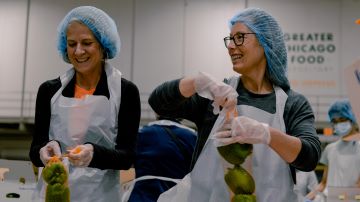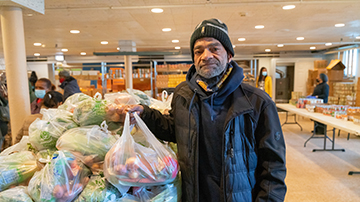
Elevating voices for change
As families struggle to regain financial stability following several years of unprecedented challenges, advocacy for stronger anti-hunger legislation is all the more critical.
2023 saw the first graduating cohort of the Food Depository’s Food Equity Ambassador program, designed to strengthen the advocacy skills of people working on the front lines of emergency food assistance. In May, some of the ambassadors joined their Community Council for Food Equity counterparts on lobbying trips to Washington, DC, and Springfield, Illinois – our first in-person Lobby Days since before the pandemic. Community Council members spoke with lawmakers and shared powerful accounts of their lived experience with hunger. Food Equity Ambassadors relayed their insightful observations from working at our partner food pantries, soup kitchens and other programs that have seen unprecedented demand.
“It’s encouraging for me to speak up for those who can’t,” said Food Equity Ambassador Wendy Daniels, who is also director of food services at Breakthrough Urban Ministries.
“We want to be a voice for the community with the community,” echoed fellow Food Equity Ambassador Lovely Sardin, senior operations coordinator for the inner-City Muslim Action Network’s Food and Wellness Center (IMAN).
Among this year’s state-level victories was the establishment of the Farm to Food Bank program – an innovative program to increase the supply of nutritious, Illinois-grown foods for local families struggling to put food on the table. The program will allow food banks to purchase fruit, vegetables, milk, cheese, meat and eggs directly from Illinois farmers and producers. It will also provide capacity-building grants to support the aggregation, processing, transportation, storage or distribution of agricultural products to underserved communities as a way to advance equity in the state’s food system.
The Food Depository is also advocating for legislative support for the Breakfast After the Bell bill, which would provide more students free breakfast options in their classroom, ensuring that more children receive the all-important first meal of the day, helping them learn and grow. The bill would offer small grants to schools to cover set-up costs such as the acquisition of equipment, staff training and outreach efforts.
“We want to be a voice for the community with the community.”
Lovely Sardin, Food Equity Ambassador and senior operations coordinator for IMAN
Nationally, the U.S. Department of Agriculture (USDA) committed $2 billion for emergency food assistance during FY23. The much-needed investment will allow Illinois and other states to order American-grown commodities from USDA for emergency food providers to distribute to our neighbors. The additional funding came at a critical time for the Food Depository, our local partners and food banks throughout Feeding America’s national network as we all work to meet the elevated demand for food amid inflation and rising food costs.
Summer feeding programs for children received a transformational boost this year with the establishment of a permanent Summer EBT (Electronic Benefits Transfer) program that will measurably reduce child hunger across the U.S. in the future. Child food insecurity is historically higher in the summer when students have reduced access to school meals. The current summer nutrition program only reaches 11.7 percent of Illinois children who receive free and reduced-price lunch during the school year.
A permanent Summer EBT program will ensure more children can access nutritious food when school is out. Starting in 2024, families will receive $40 per child per summer month. The EBT cards will provide relief for many of the same households that were eligible for the Pandemic EBT program and is a critical step toward ending child hunger.
While important strides were made towards ending hunger in the community, the investments highlight the continued need for a consistent, reliable increase in annual funding for The Emergency Food Assistance Program (TEFAP) in the upcoming Farm Bill to ensure that our neighbors receive the nutrition they need to thrive.
We urge Congress to find ways to strengthen the Supplemental Nutrition Assistance Program (SNAP) in the Farm Bill so that households trying to make ends meet can continue to put food on the table. SNAP is our nation’s foremost defense against hunger. While charitable organizations are a vital part of the movement to end hunger, we cannot do it alone. We need the support of our policymakers to protect SNAP and make it accessible for our neighbors at risk of food insecurity.
The Food Depository is also making some essential changes to our infrastructure, as increased demand for food assistance and the growth of our network require us to optimize our warehouse operations for the future. A new inventory management system utilizing RF (Radio Frequency) devices will support real-time inventory transactions, boosting accuracy and efficiency. By embracing technology and upgrading the layout of our warehouse, we can better serve our community and create an improved work environment for our operations team.
These changes will allow the Food Depository to provide weekly deliveries for all partners that want them. Real-time inventory with pallet-level visibility improves the end-to-end process, from receiving through delivery at community partner sites. The newer process will get fresh food to our neighbors more quickly and allow our team to keep more key items in stock. Management metrics and reporting will give us better visibility into overall performance and challenges, ensuring that we will be well prepared to meet the ongoing need for food in the community for as long as necessary.




